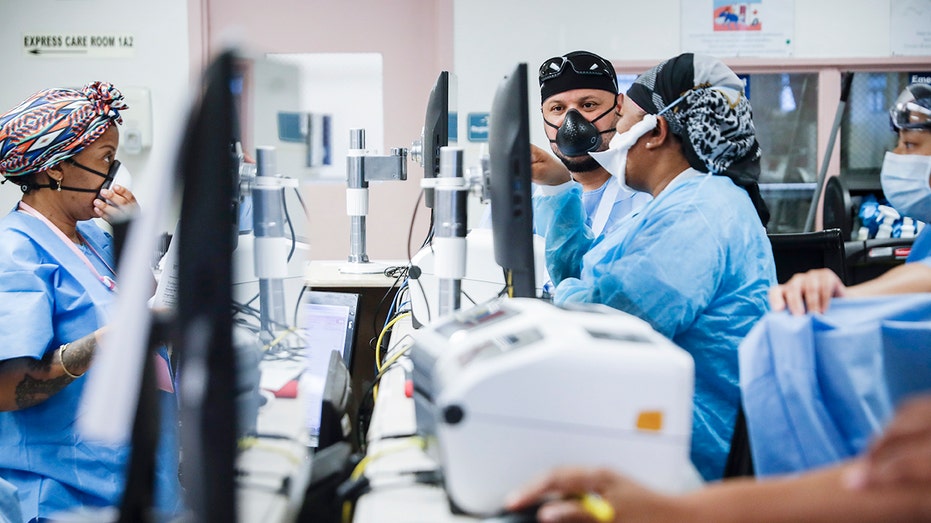U.S. hospitals see rising COVID-19 rates, strain from staff shortages
Job openings in health care and social assistance are more than double their pandemic lows
Hospitals struggling to keep up with demand amid staffing shortages, rapid spread of omicron
Dr. David Buchin, the director of bariatric surgery at Huntington Hospital, argues the slowdown of elective surgeries coupled with more overtime pay for staff 'puts a damper' on profits for hospitals.
As COVID-19 cases reach record highs, hospitals around the U.S. are struggling to meet the capacity of patients. An ongoing staff shortage is leaving systems stretched thin and forcing elective surgeries to be postponed.
While health care workers continue to call out sick, many are calling out for the long haul and have not been replaced. Job openings in health care and social assistance are more than double their pandemic lows.
BIDEN ADMINISTRATION TO REQUIRE INSURERS TO PAY FOR EIGHT COVID-19 TESTS PER MONTH
"In some cases it’s not as if we don’t have the equipment, and we don’t have the beds, we just don’t have the staff to take care of the necessary demands relative to the care," Richard Pollack, president and CEO of the American Hospital Association, told FOX Business.
It is estimated that the U.S. could reach a critical shortage of over 3 million health care workers by 2026, according to EMSI, a leading labor market analytics and human capital organization.
While the Great Resignation is affecting all industries, it’s especially being felt in the health care sector.
"Within the medical profession, there are a lot of physicians that are just tired of it, and they're retiring early," Dr. David Buchin, director of bariatric surgery at Huntington Hospital on Long Island, New York, told FOX Business. "They don't want to deal with COVID anymore. And we're going to see a large physician shortage."
In addition to burnout and early retirements, thousands of nurses and health care workers are losing their jobs over refusing to follow COVID-19 vaccine mandates. Meanwhile, the future generation of prospective recruits shows it’s not apt to work long hours, he said.
"The younger generation is not apt to work like the older generation," Buchin said. "The older surgeons who are still going worked 120 hours, they were always at the hospital. This younger generation doesn't do that today. They put lifestyle first, and that's another thing that's going to be an issue in the future."
In some cases, the overload is forcing hospitals to deny patients. At one medical center in Brooklyn, officials asked ambulances to be diverted to other locations, although it only lasted for two hours. Some ambulance corps at other locations are under new orders to try to convince patients in stable conditions not to go to the hospital.

(AP Photo/John Minchillo)
US LABOR SECRETARY: ‘NO QUESTION’ OMICRON WILL IMPACT NEXT MONTH’S JOBS REPORT
The staffing strain is not only impacting the quality of health care, but also hospitals' bottom lines.
To fill the void, many hospitals are turning to temporary employees, including traveling nurses, a solution that experts say is not affordable. In New York, nurses make around $2,000 a week, but a traveling nurse working in an understaffed hospital is offered as much as $10,000 a week.
An analysis of workforce data found that staffing shortages have cost hospitals $24 billion over the course of the pandemic, including expenses from overtime pay and personal protective equipment and masks, as well as canceled surgeries, which is one of the top generators of revenue for many places.
"With the slowdown of surgery, and especially when the hospital has to pay more overtime to our nurses and our clinical teams, that puts a damper on their bottom line and they are going to suffer in 2022 and 2023," Buchin said.
CLICK HERE TO READ MORE ON FOX BUSINESS
The most severe financial hit occurred when elective surgeons shuttered operations in March through May of 2020, totaling millions in revenue, according to Buchin.

Medical personnel work in the emergency department at NYC Health + Hospitals Metropolitan, Wednesday, May 27, 2020, in New York. (AP Photo/John Minchillo)
Although the current wave of COVID-19 is not canceling procedures this time around, hospitals are still losing a large volume of them as the omicron variant continues to sideline employees and patients.
"Without the support of our workforce, the whole system will collapse," Pollack said. "I talk to hospital CEOs across the country and ask them what their major concern and top priorities are: They say workforce number one, workforce number two and workforce number three."




















